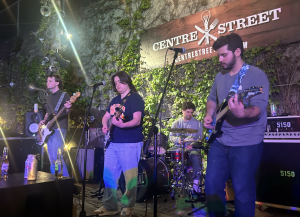Discussion on cleaning oceans
February 11, 2019
Engineers for a Sustainable World (ESW) and Ozone Haus co-sponsored an event titled, “Anger into Activism: Strategies for Saving Our Blue Planet” about methods for cleaning up disposable plastic waste from rivers and oceans.
This event took place on Thursday, January 31 and was divided into two presentation and discussion sections, the first focusing on technology and strategies for cleaning up existing pollution and the second addressing ways to lessen and prevent disposable waste from getting into the ocean in the first place.
In the first portion, ESW members described two efforts to remove waste.
The first was an active method that was employed by the non-profit The Ocean Cleanup Project to fight a build up of garbage in the Pacific Ocean known as “the Great Garbage Patch,” which launched an expedition in 2018 to cleanup using System-001, which is a a 600 meter long trawl with a 3 meter deep skirt designed to pick up trash floating in the Patch.
The Great Garbage Patch is estimated to contain 1.8 trillion pieces of garbage in it. The Ocean Cleanup Project estimates that with a fleet of 60 just systems 50% of the Great Garbage Patch could be clean in five years, although the Patch is growing exponentially.
The second effort that was discussed is known as “Mr. Trash Wheel,” a passive method of trash collecting that sits in the Baltimore Harbor.
Mr. Trash Wheel, which was designed and built in 2008 and received a major upgrade in 2014, uses the flow of the inlet rivers to the Harbor to power a conveyor belt which ferries litter from a surface net to dumpsters in the device.
On April 20, 2016, Mr. Trash Wheel removed 19 tons of garbage from the Harbor after a severe rainstorm.
The technology was used to create two more trash wheels: Professor Trash Wheel, built in 2016 and Captain Trash Wheel, built in 2018.
Neither of these methods were designed by people with an engineering degree, a fact used to prompt people in attendance to work in groups to design their own methods of cleaning up a high traffic polluted river downstream of a major city.
The attendees decided on that two ideas stood out.
One was proposed by Kira Wilson ’20, called “we all trawl,” in which a tax incentive would be given to people who agree to trawl a net behind their boats, thereby picking up garbage in high traffic areas.
The other was suggested by Carlos Piedad ’19 and consisted of nets and conveyor belts would be deployed beneath existing infrastructure, such as bridges, to constantly clean trash out of low traffic areas.
The second portion of the talk, on ways to prevent trash from being generated in the first place, focused mostly on efforts to tax or ban plastic bags and other disposable plastic items by state governments.
According to the Tax Policy Center, when Chicago implemented its $0.07 plastic bag tax in February of 2017, plastic bag use dropped by 42% in the first month.
Similarly, the effects of California’s aggressive total ban on plastic bags, the banning of giving out plastic straws in restaurants and a $0.10 tax on disposable paper bags, was discussed.
A law was passed in 2016 with the intent of keeping bags out of beaches in California, which not only can float into the ocean, but are often consumed by animals mistaking them for jellyfish or other types of food.
A year after the ban was passed, there was an 8.8 percent decrease in grocery bag litter on California beaches
Opponents against the ban cited that lower income citizens were hurt the most by these taxes, since the such a tax would encompass a higher percentage of their income, and that a lot of environmental issues had an economic component.
One of the reasons so much litter was generated in the first place is due to ease and low cost of manufacturing disposable plastic items.
Such taxes are usually written by people who are in the financial position to pay for either more expensive, non-disposable options or more environmentally friendly and reusable plastic bags.
ESW proposed writing a letter to the Schenectady City Council to ask of a tax or ban on disposable plastic bags and then to offset the economic burden of the ban, hand out free reusable bags at the already EBT friendly Schenectady Green Market.
ESW will hold a two meetings to discuss fundraising and planning for this plan in the coming weeks. The first meeting will be on Thursday, February 7 during common lunch in N222.






